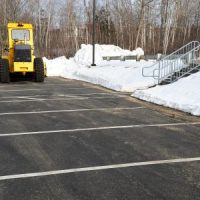What Is an Indiana Property Owner’s Obligation to Remove Snow From Its Parking Lot?

A common problem faced by slip-and-fall accident victims is the need to prove that the property owner had “constructive knowledge” of whatever it was that caused the victim to fall in the first place. For example, let’s say you slip and fall on an icy sidewalk outside the supermarket. The supermarket owner is only liable for your injuries if you can prove it should have known there was a danger posed by ice accumulation and failed to take reasonable steps to remedy the problem.
Indiana Court Allows Injured RV Transport Driver to Proceed with Lawsuit
Obviously, property owners often deny any knowledge or responsibility for such hazards. But in many cases, their own operating procedures can be cited as evidence to the contrary. Take this recent decision from the Indiana Court of Appeals, Sanford v. HTIW Properties, LLC. The defendants in this case run a business transporting recreational vehicles (RVs) across the country. They hired the plaintiff as an independent contractor to transport one such RV. This required the plaintiff to pick up the vehicle from the defendant’s storage facility in Elkhart, Indiana.
A few days before the pickup, Elkhart received about three-and-a-half inches of snow over a two-day period. On the day of the pickup itself, there was still snow on the ground in the defendants’ RV parking lot. The plaintiff attempted to navigate the lot as best she could but failed, slipping and falling as she attempted to reach her RV. The fall broke the plaintiff’s leg, requiring her to undergo three separate surgeries.
The plaintiff subsequently filed a personal injury lawsuit against the defendants in Indiana state court. (Since the plaintiff was an independent contractor and not an employee, her accident was not covered by workers’ compensation.) The trial court dismissed the lawsuit at the summary judgment stage, however, finding that the presence of snow and ice in the defendants’ parking lot was a known and “obvious” hazard.
But the Court of Appeals reversed the grant of summary judgment, holding the trial judge failed to challenge the defense’s failure to point to any evidence regarding its own knowledge of the icy conditions at the parking lot on the day of the accident. Meanwhile, the plaintiff pointed to evidence that suggested the defendants “had at least constructive knowledge of the conditions” that day.
More to the point, the defendants admitted their corporate policy was to only conduct an assessment of ice and show conditions when accumulation reached 4 inches or more. As previously noted, there was less than 4 inches of accumulation when the plaintiff fell. That, however, was the Court of Appeals’ point: The plaintiff could argue to a jury that the policy was “unreasonable” and created a foreseeable danger to anyone walking through the parking lot.
Contact a Madisonville Slip & Fall Lawyer Today
Property owners often claim that slip-and-fall accidents are the result of “open and obvious” dangers that victims should have seen coming. But if you have been the victim of such a fall, you do not need to accept such a self-serving defense at face value. Our Madisonville slip and fall lawyers are here to help. Contact Whitfield Crosby & Flynn today to schedule a free consultation. We have offices in Madisonville, Kentucky; Chattanooga, Tennessee; and Indianapolis, Indiana.
Source:
scholar.google.com/scholar_case?case=17542157177311081617
